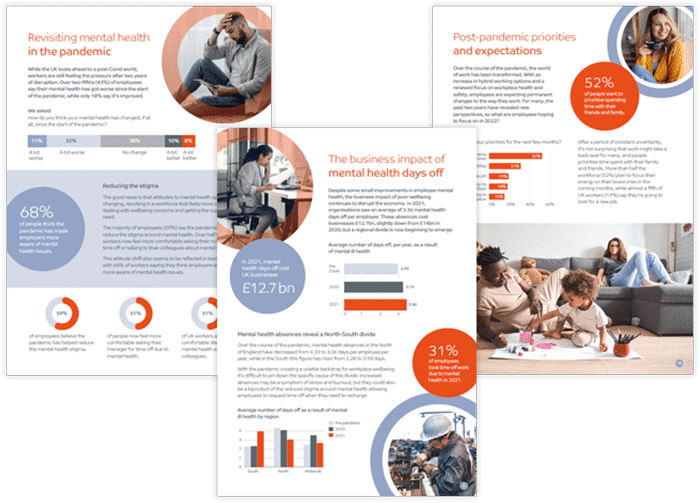Two years after Covid-19 reached UK shores, the pandemic continues to shape the way we work. Following on from last year’s Coping with Covid report, we asked 1,500 people from across the UK about their attitudes to workplace wellbeing and mental health.
The free report, titled Our Changing Attitudes to Mental Health, reveals some key changes in employee perspectives, largely shaped by our new ways of working. The report also evaluates the true impact of mental health days off and provides some useful resources to help business leaders support their people in the post-Covid workplace.
Key findings from the report

- In 2021, businesses saw an average of 3.36 mental health days off per employee, costing the UK economy £12.7bn.
- 43% of workers say their mental health has got worse since the start of the pandemic.
- 31% of UK employees took time off work due to mental health in 2021.
- 66% of mental health absences are longer than five days.
- 68% of people think the pandemic has made employers more aware of mental health issues.
- 73% of people are worried about the increased cost of living.
- 52% of people want to prioritise spending time with their family and friends.
- 28% of people want long-term changes to the way they work.
Exploring the impact of workplace mental health
The report reveals an average of 3.36 days off due to mental health per employee in 2021, up from 3.19 in 2020, at a cost to businesses of £12.7bn. And while workers feel their wellbeing is slightly better than a year ago, 44% find their mental health affects their productivity at least once a week.
For many, the pandemic has prompted a change in perspective, with 51% of workers saying their friends and family are their top priority for the coming months. The majority of workers (68%) think employers are more aware of mental health issues now, but with 73% of people worried about the cost of living, the post-pandemic world looks set to present new challenges for workplace wellbeing.
A North/South mental health divide is beginning to emerge
Digging deeper, the research reveals a North/South divide in mental health, with it appearing to have become worse in the South of England (46%) compared to the North (39%).
Despite this, the discussion around mental health and wellbeing is improving, especially for those in the South, meaning they’re more likely to take time off to recharge (34%) compared to those in the North (26%).
This has resulted in those in the South taking an average of four days off each year – one more than those in the North – while also feeling more comfortable to ask for it (55% vs 48%), and happier to discuss with their colleagues (57% vs 46%).
Despite this trend, each organisation will face its own unique challenges as we emerge from the pandemic, and leaders will be expected to promote open conversation about mental health in the workplace. Regular communication with managers will provide perspective on mental health absences within their department, allowing HR teams to identify any gaps in the support they offer and help their people get back to their best.
Read the full report for free
For a more detailed analysis of the state of workplace mental health and how employers can provide support, read the full report: Our Changing Attitudes to Mental Health.
